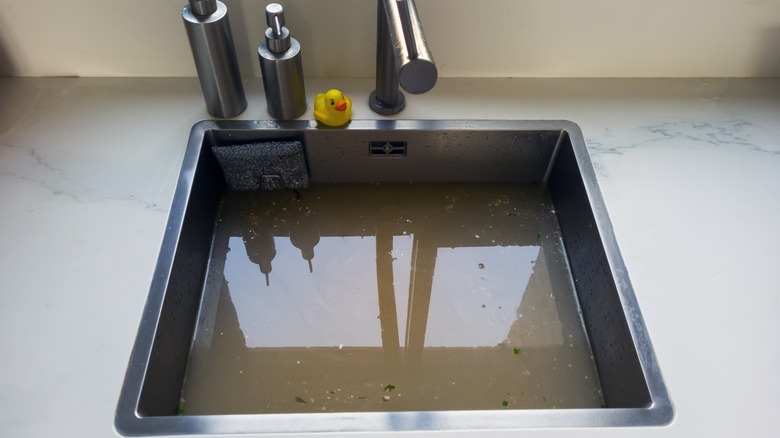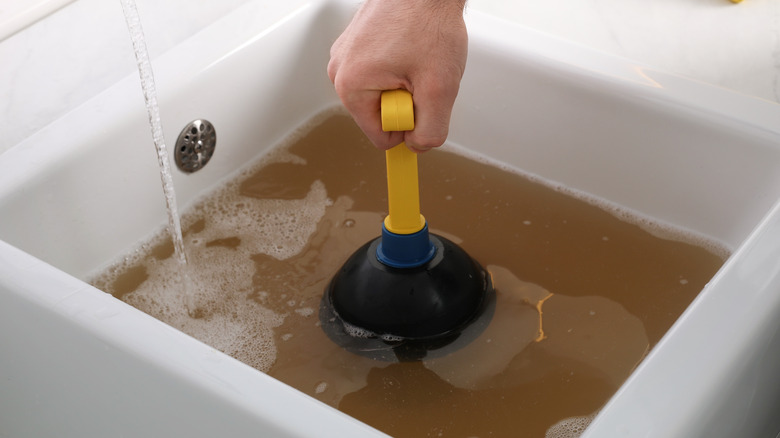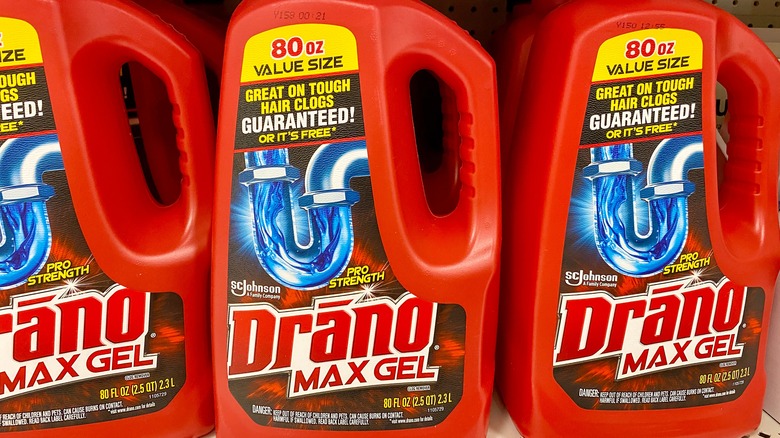The Clever Trick To Unclog Your Kitchen Sink Without Any Tools
Few things are more frustrating than a clogged kitchen sink. When food debris prevents water from draining properly, you must deal with the burden of not being able to use your sink until it is repaired. To make matters worse, a clogged sink often leads to standing water that harbors bacteria and foul smells. Luckily, it's pretty easy to unclog your sink yourself as long as you follow the proper steps. Depending on the severity of the plumbing issue, you may not even need to use any tools. Frontdoor Virtual Plumbing Expert James Burroughs explained that you can sometimes get the job done with just your hands by clearing food from your sink's basket strainer.
In other instances, you may need to use tools to get your drain unclogged. However, it is still possible to complete this at home yourself. While speaking exclusively with House Digest, Burroughs shared more about the items you will need to use to unclog your drain. "If the issue is beyond the sink bowl itself, you will have to utilize a plunger or — if even farther down the drain — drain snake," he explained. Once you have gathered the necessary supplies, follow Burroughs' guidance to safely get your kitchen sink draining properly again.
How to unclog your sink yourself
If there is simply food blocking your sink's strainer, feel free to use your hands to scoop it out and dispose of it. Next, run water and evaluate whether it is draining as it should. If it is draining slowly or stagnant, you may need to go in with a tool. Burroughs shared simple instructions that you can follow to remove these drain blockages yourself. "First, conduct a visual inspection, then clear any visible debris and lastly, start with a plunger," the expert explained while speaking exclusively to House Digest. He warned that you should never use this method to attempt to unclog a drain with a garbage disposal.
There are a few other precautions you should take when attempting this DIY plumbing repair, especially if you choose to use your hands. "You must be sure of safety first!," Burroughs cautioned. "If standing water is present, you should take care to see that there are no knives or other sharp object you could injure yourself on as you attempt to clear the drain."
Avoid drain clearing chemicals and know when to call a professional
Homeowners often use harsh chemicals to unclog drains. However, you may want to avoid this popular drain unclogging hack. "Professional plumbers should never recommend using caustic liquid cleaners," Burroughs shared. "They are detrimental to the environment as well as your plumbing drains. If clearing debris by hand is not effective, next step is a plunger." One of the benefits of unclogging your kitchen sink using the methods recommended by Burroughs is that you get to skip out on pouring these harmful substances down your drain.
Of course, there is a chance that the aforementioned genius tips for unclogging the kitchen sink will not solve your problem. If your clog particularly severe, you may need to call a professional to have them tackle the issue instead. It is important to recognize when your plumbing problem cannot be handled with a DIY. This way, you can avoid causing damage. "If the above does not work, you may need to call a professional to assist and provide a cable rooter or high-pressure hydro-jetter as the best option for clearing a kitchen sink stoppage," Burroughs explained exclusively to House Digest. "Because of the high grease content in kitchen drains, these methods are often proven most effective."


